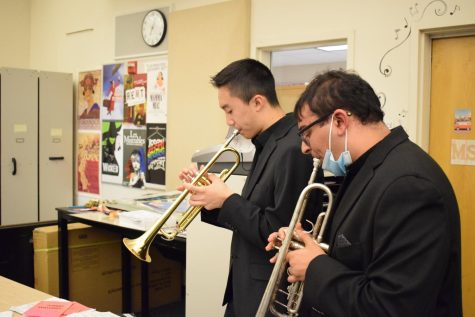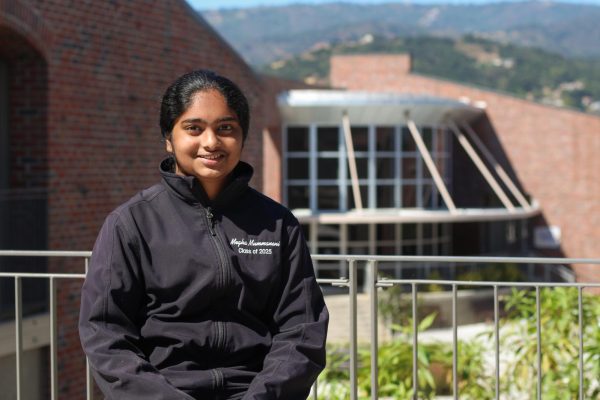Performing with perfect pitch
Exploring life through the ears of a high school musician with perfect pitch
April 24, 2023

Perfect pitch, also known as absolute pitch, is an ability only 0.01% of the population and an estimated 4% of musicians have. From Ludwig Van Beethoven and Wolfgang Amadeus Mozart to Mariah Carey and Charlie Puth, some of the most renowned musicians have this skill. Senior Aris Yang, a trumpet player in Wind Ensemble, also shares this unique talent.
Aris initially discovered that he had perfect pitch during a band concert in his sophomore year. As his friend was tuning her instrument, Aris was able to identify the notes. He didn’t realize that a majority of others did not share this talent until his friend pointed it out.
“She was tuning and I was tuning, but I heard her playing and I was like, ‘Oh, you’re playing an F,’” Aris said. “And then she was like, ‘What? How do you know?’ And so she played another note, and then I was able to identify it. Then she was like, ‘I’m going to try again.’ And then she played a concert E. I was like, ‘Oh, yeah you’re playing concert E.’ That’s pretty much how she figured it out.”
Freshman Skyler Yang, Aris’ sister, says although she didn’t think much of Aris’ perfect pitch at first, she grew to recognize its significance after Aris demonstrated the full extent of his abilities to her, which made her see that Aris could identify individual pitches, even when they were played as chords.
Those with perfect pitch can accurately determine notes by ear, which Aris can do for both notes played by instruments and sounds made by random objects. As a trumpet player in MVHS’s Wind Ensemble, he finds it predominantly useful when tuning and practicing ear training in class.
“When you have perfect pitch, you can recognize notes and you can tell easily if you’re out of tune or not,” Aris said. “So I think it’s very helpful for me [in] determining that. We also have tuners as well that can help us, but before we had tuners, I’d be able to listen [to myself]. I’d be like, ‘OK, I’m out of tune. I need to correct my pitch here.’”
Though it is disputed whether perfect pitch is purely genetic or can be learned, some studies have found that early musical training and exposure can increase the likelihood of having the skill.
In Aris’ case, his instrumental journey began in early childhood, when he started playing the piano at 7 years old and picked up the trumpet in seventh grade. Aris’ whole family also plays a variety of instruments. His father plays the piano, and his mother used to play the flute in high school. Skyler, who used to play the piano, violin and electronic drum, now sings in MV’s Esperanza. Aris agrees that his family history surrounding music could explain why he has perfect pitch.
“I think playing instruments early on definitely helped. I [also] listened to a lot of different genres of music,” Aris said. “But overall, I’m not sure how I actually got this ability, whether it’s genetic or you can learn it. My dad does not have perfect pitch. I don’t think my mom does either. It’s definitely a new, unique, interesting and maybe weird ability.”
Likewise, Skyler also believes Aris’ perfect pitch could be partially genetic, but shares that his ability to recognize pitches quickly with ease could have been a result of his extensive musical training as well. However, Skyler notes that while she was also musically trained, she doesn’t have the ability.
Senior Akanksha Varanasi, a friend of Aris’ and clarinetist in Wind Ensemble, also finds his ability very beneficial and is appreciative of his willingness to help as a friend and fellow musician. She recalls asking Aris to transpose the theme from one of her favorite TV shows, “The West Wing,” so she could further develop it as a clarinet quartet for her chamber group project.
Aris also uses his ability to write arrangements. For example, he arranged a remix based on the video game series, Portal. He shares that he mostly keeps the arrangements to himself, though, as it’s “sort of [his] own thing.”
“I wrote several arrangements of music [of] songs that I heard and liked,” Aris said. “I also wrote one for my friend. [The songs] could be from pop culture, movies or classical music and those are some times where I use my perfect pitch.”
Varanasi recalls another time when Aris was able to transpose the notes from a Bollywood film for her to play on the piano for her mother. She says that by herself, she “would have had to sit down at the piano for an hour trying to figure out each note.”
“He was able to do it relatively fast because of his perfect pitch,” Varanasi said. “I showed my mom, and she was really impressed and she liked [the song] a lot. I was really happy because my mom liked it and also because Aris was willing to help me, and he was really great about that. And I think Aris was happy because, you know, we all like making people happy.”
Aris adds that while having perfect pitch is advantageous in many aspects of music, it isn’t vital for those wishing to or currently pursuing music.
“It’s a great ability, I’ll just say that,” Aris said. “It’s really cool. And I think you can impress a lot of musicians with that. However, there are plenty of musicians out there that do not have perfect pitch, but are amazing at their instruments. I just think that having perfect pitch is a nice supplement. But it’s not required. You can still identify intervals without perfect pitch, but for me, it makes it easier.”
[I also] think being unique is very important, and just having a rare ability makes me unique.
— Aris Yang
Varanasi agrees and recognizes that Aris’ talent builds on to his musicianship, rather than purely creating it.
“I’m jealous because I wish I had it,” Varanasi said. “But Aris is a really good musician either way, and I think perfect pitch is a really unique aspect of musical training. I think perfect pitch just helps him with other aspects of music that don’t necessarily translate just into band because band isn’t just about playing [an instrument].”
Overall, Aris says his favorite part about having perfect pitch is getting to see people’s reactions when they see the special things he can do with the ability. Aris also appreciates how it adds to his individuality.
“I love being able to recognize notes because — I don’t want to brag — but it’s a rare ability,” Aris said. “With my friend, when she first figured out that I had perfect pitch, she was really impressed by it. And then she asked me a lot of questions about it. So when they’re like ‘Oh gosh, how do you do that?’ I get a reaction. [I also] think being unique is very important, and just having a rare ability makes me unique.”

















